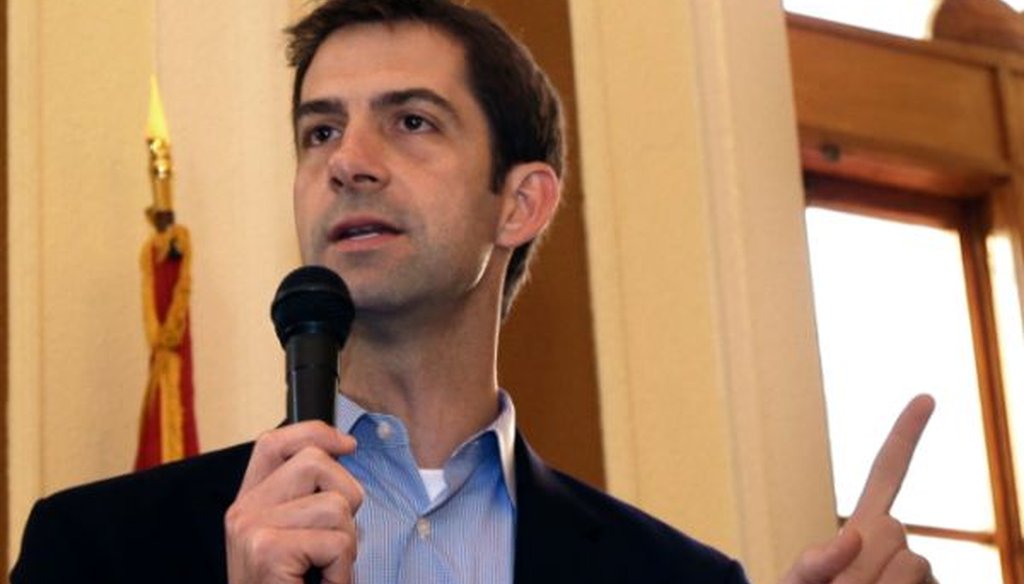Stand up for the facts!
Our only agenda is to publish the truth so you can be an informed participant in democracy.
We need your help.
I would like to contribute

Sen. Tom Cotton, R-Ark., made waves when he spearheaded a letter signed by 47 Senate Republicans casting doubt on the ability of a nuclear deal with Iran to survive Senate scrutiny. He's shown in an Oct. 31, 2014, photograph taken in Jonesboro, Ark.
The already contentious process of negotiating a nuclear deal with Iran became even more so this week, when 47 Republican senators sent an open letter to the Iranian leadership, effectively flexing Congress’ muscles as a possible disruptor of a deal.
We checked a few claims made during the ruckus.
One was a claim in the letter itself, spearheaded by newly installed Sen. Tom Cotton, R-Ark.
Cotton and 46 of his Senate Republican colleagues said in the letter that they "will consider any agreement regarding your nuclear-weapons program that is not approved by the Congress as nothing more than an executive agreement between President Obama and Ayatollah Khamenei. The next president could revoke such an executive agreement with the stroke of a pen and future Congresses could modify the terms of the agreement at any time."
The independent experts we spoke to said the Republican senators’ letter was generally correct, but also was something of an oversimplification.
Sign up for PolitiFact texts
Treaties with foreign countries are negotiated and signed by the executive branch, but ratification only occurs after the Senate gives its approval in a two-thirds vote. But there’s another kind of agreement beyond treaties -- indeed, they represent a growing share of agreements in recent decades. They are known as "executive agreements."
The upside of pursuing an executive agreement is that they are easier to negotiate -- they don’t require approval from Congress, which (as the current episode makes clear) removes a major obstacle. The downside of an executive agreement, however, is that it’s easier to reverse.
"It is clear, constitutionally, under internal law, that a future president could do this," said Jeffrey S. Peake, a Clemson University political scientist. Arend concurred that such an action would likely be constitutional.
But while there’s support for the senators’ claims, most of our experts added that the letter oversimplified the matters at hand. Namely:
• It is an exaggeration to say that future Congresses could "modify" an agreement "at any time." The possible agreement with Iran is being negotiated between the five permanent United Nations Security Council members plus one: the United States, the United Kingdom, France, Russia and China, plus Germany. So for the agreement to be truly modified, the other signatories would have to sign off, Peake said -- something that is hardly a sure thing.
Instead, Congress could pass legislation that conflicts with the agreement, effectively "modifying" it. But Congress' ability to carry this out is more difficult than the senators' blithe language suggests. "It would take presidential acquiescence or a supermajority -- two-thirds to override a veto -- for Congress to act independently to stiffen sanctions," Peake said. "It is very complex."
• Going back on an executive agreement may violate international law. While Congress has the power to violate international law -- and the ability of the international community to punish a violation is debatable -- "the real question, which I think both sides are missing, is whether overriding would violate international law," which requires compliance with binding agreements, said Michael D. Ramsey, a law professor at the University of San Diego.
• Going back on an executive agreement could have significant, if intangible, consequences for the nation’s diplomatic credibility. Retreating from one executive agreement would be a pretty radical step historically and could endanger the nation's ability to both ensure that old agreements stand and to strike new agreements.
We found that the statement was accurate but needed additional information, so we rated it Mostly True.
Meanwhile, we also checked a claim by Sen. Ron Johnson, R-Wis., that "the Iranian parliament will get to say yes or no on this deal, and I think the United States Congress should have the exact same input into the process."
It was a curious comparison, but was it accurate? We looked at it through two lenses: What does Iran’s Constitution literally say about the duties of the parliament, called the Islamic Consultative Assembly or the Majles? And in practice, what responsibilities does the parliament actually have in an authoritarian regime heavily controlled by the Supreme Leader and the unelected 12-member Guardian Council?
We found this to be incorrect on two counts.
Experts said the nuclear agreement between the United States and Iran won’t require ratification by Iran’s parliament, the Islamic Consultative Assembly. It’s possible the deal will be contingent on Iran’s ratification of a previous international nuclear agreement, which might require the assembly’s approval, but the body won’t weigh in on the deal currently being worked on.
And even if it did, it would be entirely symbolic, as the assembly is heavily influenced by the Supreme Leader on foreign policy matters.
On balance, we rate the statement Mostly False.
We’ll update this article as we complete additional fact-checks on this topic.
For a roundup of some of our previous fact-checks on Iran, see this article.
Our Sources
See original Truth-O-Meter items.






































